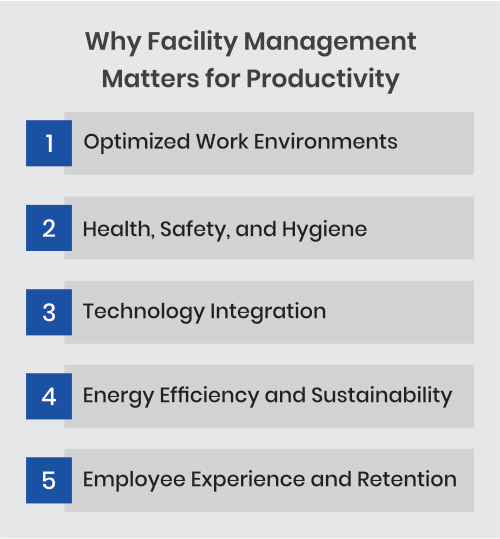Facility management in India has evolved from basic upkeep to a strategic driver of workplace productivity. By integrating services like facility maintenance, façade cleaning, housekeeping, energy management, and catering, facility management companies in India create efficient, safe, and engaging work environments. With growing demand for sustainability, technology adoption, and integrated solutions, facility planning in India is now central to organizational success. Effective facilities management in India not only boosts employee performance but also enhances business continuity and growth.
The Role of Facility Management in Enhancing Workplace Productivity in India
Introduction
In today’s rapidly evolving business landscape, organizations in India face increasing pressure to optimize their workplaces for efficiency, sustainability, and employee satisfaction. Whether it’s a manufacturing plant, a corporate office, or an IT hub, the physical environment directly impacts productivity and performance. This is where Facility Management Companies in India play a crucial role. By ensuring seamless facility planning in India, robust maintenance systems, and integrated service delivery, these companies enhance workplace productivity while supporting business continuity.
This blog explores the pivotal role of Facility Management India in enhancing productivity, with insights into best practices, modern approaches, and the growing importance of Integrated Facility Management in India.
Facility Management: Beyond Cleaning and Maintenance
Traditionally, facility services management in India was limited to housekeeping, building upkeep, and maintenance. However, the scope has expanded significantly. Today’s facilities management in India encompasses a wide range of services, including:
- Mechanized housekeeping and hygiene solutions
- Energy and sustainability management
- Technical operations and maintenance of utilities
- Industrial food and catering services
- Horticulture and landscaping
- Facade cleaning in India’s commercial hubs
- Digital compliance and technology integration
By combining these services into a comprehensive strategy, organizations can create safe, efficient, and productive workplaces.
Why Facility Management Matters for Productivity

1. Optimized Work Environments
A clean, well-maintained environment reduces distractions and allows employees to focus on their core tasks. From facility maintenance in India’s industrial hubs to smart HVAC systems in corporate offices, facility managers ensure that workplaces operate at peak efficiency.
2. Health, Safety, and Hygiene
Employee health directly affects productivity. Post-pandemic, hygiene protocols, disinfection, and facade cleaning in India’s high-rise buildings have gained importance. Facility managers implement strict standards aligned with ISO, FSSAI, and OSHA norms to ensure employee well-being.
3. Technology Integration
Digital tools such as IoT-based monitoring, CAFM (Computer-Aided Facility Management) systems, and AI-driven scheduling enhance efficiency. By digitizing facility services management, organizations gain real-time visibility into asset performance, space utilization, and workforce productivity.
4. Energy Efficiency and Sustainability
With rising energy costs, facility planning in India now emphasizes sustainable practices such as green buildings, solar energy, water recycling, and waste management. Reduced operational costs not only improve profitability but also reflect positively on employee morale and corporate reputation.
5. Employee Experience and Retention
Comfortable, safe, and aesthetically pleasing workplaces foster employee engagement. Services like cafeteria management, indoor air quality monitoring, ergonomic space design, and quick maintenance support directly impact job satisfaction and reduce attrition rates.
Facility Planning in India: A Strategic Necessity
Effective facility planning in India goes beyond physical infrastructure. It involves aligning workspace design, maintenance schedules, and services with organizational goals. For instance:
- Manufacturing sector: Prioritizing facility maintenance in India’s industrial belts ensures machinery uptime and workplace safety.
- IT and corporate sector: Focus on ergonomics, lighting, and HVAC systems to enhance productivity.
- Retail and commercial spaces: Emphasizing facade cleaning in India enhances brand image and customer footfall.
Strategic facility planning ensures that every square foot of workspace contributes to productivity and business outcomes.
Integrated Facility Management: A Holistic Approach
The rise of Integrated Facility Management in India (IFM) has transformed the industry. Instead of outsourcing services piecemeal, organizations now prefer end-to-end solutions from a single service provider. Benefits include:
- Efficiency through centralization: All services-from housekeeping to energy management-are delivered seamlessly.
- Cost-effectiveness: Eliminates duplication and reduces administrative overheads.
- Accountability: A single partner ensures adherence to Service Level Agreements (SLAs).
- Innovation: IFM providers invest in technology like smart sensors, automated cleaning systems, and predictive maintenance tools.
In cities like Bengaluru, Pune, and Gurgaon, IFM has become the preferred choice for multinational corporations and Indian conglomerates alike.
Facility Services Management in Key Sectors
1. Manufacturing and Heavy Industry
Here, productivity depends on the continuous functioning of equipment. Facility maintenance in India ensures machinery uptime, energy conservation, and worker safety. Industrial canteens managed by facility providers also boost employee morale.
2. IT & Corporate Sector
India’s IT hubs thrive on talent. Facilities management in India for IT parks emphasizes employee experience-well-maintained campuses, ergonomic designs, recreational spaces, and cafeteria services. This creates an environment conducive to innovation.
3. Healthcare
Hospitals rely heavily on facility services management for sanitation, biomedical waste management, and technical maintenance. Productivity here translates into patient satisfaction and operational efficiency.
4. Real Estate and Commercial Spaces
From malls to office complexes, facade cleaning in India is critical to maintaining aesthetics and brand image. Integrated pest control, security, and energy management also ensure uninterrupted operations.
5. Educational Institutions
Universities and schools increasingly engage facility management companies in India for sanitation, catering, landscaping, and hostel management—ensuring a safe and inspiring environment for students and staff.
Technology and Innovation in Facilities Management India
The future of facility management in India is closely tied to technology adoption:
- IoT-based predictive maintenance: Reduces downtime by detecting faults early.
- Smart energy systems: Track consumption and suggest optimization strategies.
- AI-driven workforce scheduling: Ensures adequate staffing during peak hours.
- Mobile apps: Allow employees to raise facility-related issues instantly.
- Digital dashboards: Provide real-time compliance monitoring.
Such innovations not only streamline operations but also enhance transparency and accountability.
ESG and Sustainability: Redefining Facility Planning in India
Environmental, Social, and Governance (ESG) goals are reshaping business practices. Facility managers play a pivotal role by:
- Promoting renewable energy: Solar rooftops, wind power tie-ups.
- Water conservation: Rainwater harvesting, wastewater recycling.
- Green cleaning: Using eco-friendly products for housekeeping and facade cleaning in India.
- Waste management: Zero-waste strategies for industries and offices.
These practices not only align with corporate ESG commitments but also foster a culture of sustainability among employees.
Challenges in Facility Management India
Despite progress, facility management companies in India face challenges:
- Cost pressures: Many organizations still see FM as a cost center, not a productivity enabler.
- Skill shortages: Lack of trained professionals in specialized areas like technical maintenance and energy management.
- Fragmented market: While multinational players dominate, local vendors often lack standardization.
- Awareness gaps: Some businesses underestimate the importance of structured facility planning in India.
Overcoming these challenges requires industry collaboration, government support, and continuous investment in workforce training.
Case in Point: Workplace Productivity Through IFM
Consider an automotive manufacturing unit in Pune. By partnering with an integrated facility management India provider, the company achieved:
- 10% reduction in energy costs through smart monitoring systems.
- Improved machine uptime by implementing predictive facility maintenance in India.
- Enhanced worker productivity due to cleaner, safer shop floors.
- Boosted employee satisfaction with high-quality cafeteria services.
This example illustrates how holistic facility management strategies directly impact productivity and profitability.
The Road Ahead for Facilities Management India
As India grows into a global economic powerhouse, the role of facility management will expand further. Key trends shaping the future include:
- Smart Cities & Digital India Initiatives: Demand for tech-enabled facility services management will rise.
- Hybrid Work Models: Office spaces will need flexible, technology-driven facility solutions.
- Green Buildings: Certifications like IGBC and LEED will drive demand for sustainable facility planning in India.
- Specialized Services: From facade cleaning in India’s high-rise skyline to offshore facility management for oil rigs, niche expertise will gain prominence.
Conclusion
The role of facility management in India is no longer restricted to back-end operations. It is a strategic enabler of productivity, employee engagement, and organizational growth. With the rise of integrated facility management in India, businesses are discovering how seamless, technology-driven, and sustainable services create workplaces where employees thrive.
By prioritizing structured facility planning in India, investing in facility services management, and embracing innovation, organizations can unlock higher productivity and achieve long-term success. In this journey, facility management companies in India are not just service providers—they are partners in building the workplaces of tomorrow.
Industries we serve:
Automobile | Ancillary | Manufacturing | Pharmaceutical | Healthcare | Oil and Gas | FMCG | Education | Real Estate | Commercial
Also read: Why Outsourcing Facility Management is a Game-Changer for Businesses in India

